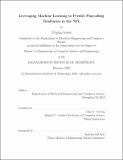Leveraging machine learning to predict playcalling tendencies in the NFL
Author(s)
Goyal, Udgam.
Download1237411720-MIT.pdf (1.904Mb)
Other Contributors
Massachusetts Institute of Technology. Department of Electrical Engineering and Computer Science.
Advisor
John V. Guttag.
Terms of use
Metadata
Show full item recordAbstract
In this thesis, we apply four machine learning models to NFL play-by-play data from 2009-2018 to predict whether a team will run or pass the ball on a given play. We tested our models using league-wide and team-specific data in five different situations on the field. Our best league-wide models achieved a test accuracy of 80% and our best team-specific models achieved a test accuracy of 86%. Relative to the baseline of the run-to-pass ratio, the best league-wide models achieved an increase in accuracy of 25% and the best team-specific models achieved an increase of 27%. Our models showed that the Tennessee Titans, the New York Jets, and the Cincinnati Bengals have been the most predictable offenses in the NFL over 10 years. We found that a team's in-game run-to-pass ratio and their win and score probabilities are the driving factors for offensive play-calling. Additionally, our results show that teams are more predictable later in games, and that less predictable teams tend to experience greater success offensively.
Description
Thesis: M. Eng., Massachusetts Institute of Technology, Department of Electrical Engineering and Computer Science, February, 2020 Cataloged from student-submitted PDF of thesis. Includes bibliographical references (pages 57-58).
Date issued
2020Department
Massachusetts Institute of Technology. Department of Electrical Engineering and Computer SciencePublisher
Massachusetts Institute of Technology
Keywords
Electrical Engineering and Computer Science.